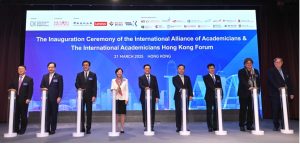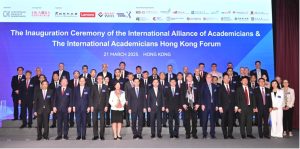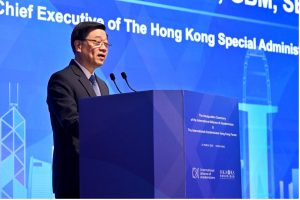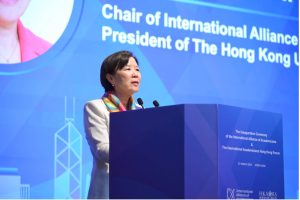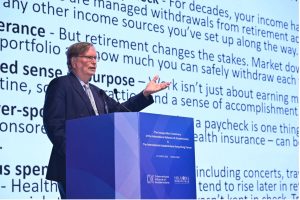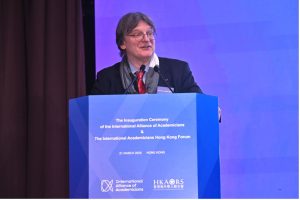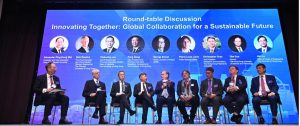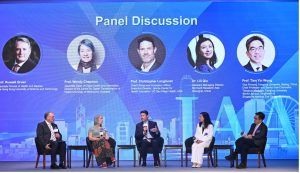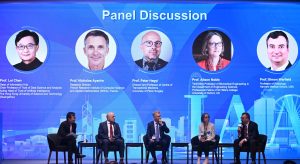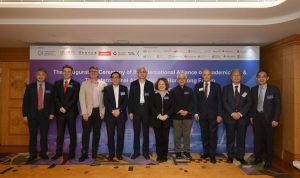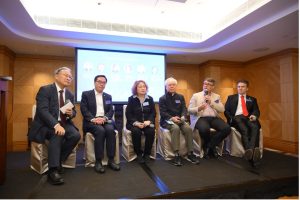The Inauguration Ceremony of the International Alliance of Academicians and The International Academicians Hong Kong Forum Successfully Held in Hong Kong
On March 21, the inaugural ceremony of the International Alliance of Academicians (IAA) and the first International Academicians Hong Kong Forum (the Forum) was held in Hong Kong. The Forum was organized by IAA which is initiated by the international academicians and scientific leaders of Hong Kong, and co-organized by the Hong Kong Association of Overseas Scholars (HKAORS) which serves as IAA’s Secretariat. Over 50 academicians from more than 20 countries and regions, along with 250 participants, shared their insights and the latest developments on the themes “AI for Health” and “Future City”. The event was honored to have Mr. John Lee, Chief Executive of the HKSAR, Prof. Dong Sun, Secretary for Innovation, Technology and Industry, the Government of HKSAR, and Prof. Weiming Wang, Director-General of the Department of Educational, Scientific and Technological Affairs of the Liaison Office of the Central People’s Government in the HKSAR serve as officiating guests.
Hong Kong has been strategically positioned as an international hub for innovation and technology and high-end talents. Its dynamic innovation ecosystem attracts elite professionals from around the globe, further enhancing the city’s talent pool. Moreover, as a key center for higher education and scientific research, Hong Kong boasts around 100 international academicians elected to eminent international academies in science, engineering, medicine, as well as the humanities and arts. Leaders from Hong Kong’s scientific community, alongside these distinguished academicians, have advocated for the establishment of the IAA to further elevate the city’s global academic stature and contributions.
IAA’s founding chairmanship consists of the Chair, Prof. Nancy Ip, President of the Hong Kong University of Science and Technology, and three Co-chairs, Prof. Pierre‑Louis Lions, Fields Medalist; Prof. George F. Smoot, Nobel Laureate in Physics; and Prof. Xiang Zhang, President of the University of Hong Kong. Nearly 30 founding members comprise the Executive Committee supporting this forward-looking initiative.
Mr. John Lee, Chief Executive of the HKSAR congratulated the establishment of IAA and noted that IAA is a Hong Kong-based international organisation with the essential mission of enhancing global co-operation among scientists and academics, working toward the sustainable development of innovation and technology, and aligning with Hong Kong’s vision of becoming an international I&T (innovation and technology) centre, as well as a global hub for high-end talent. The Alliance is a testament to the power of collective wisdom, a commitment to the open exchange of ideas, and a celebration of humanity’s boundless innovation. The Government is committed to cultivating a dynamic environment, one that champions innovation and technology, in every sector and industry, every institution and corner of our community. In addition the Government will soon launch a Frontier Technology Research Support Scheme, worth 3 billion Hong Kong dollars, or nearly 400 million US dollars. It will help fund ground-breaking basic research driven by world-class researchers and academics.
HKUST President Prof. Nancy IP who chairs the Alliance expressed her gratitude for the support from the HKSAR Government, IAA’s Co-chairs and Executive Committee, and the presidents of various local universities. Their support has been instrumental in enabling IAA to successfully invite globally renowned scholars to join this occasion in Hong Kong, “In today’s rapidly changing world, the need for cross-regional, inter-disciplinary and cross-boundary synergy has never been greater. Hong Kong’s higher education institutions are internationally acclaimed, and we aim to leverage our strengths to foster more international research collaborations. The Alliance will serve as a knowledge-sharing platform, bringing together top scholars and I&T leaders to regularly convene academic conferences and brainstorm innovative solutions to address complex global challenges. In doing so, we hope to further solidify Hong Kong’s position as an international hub for both innovation and technology, as well as post-secondary education,” she said.
During the session of plenary lecture, IAA‘s Co-Chairs, Nobel Laureate in Physics Prof. George F. Smoot and Fields Medalist Prof. Pierre‑Louis Lions each delivered a speech—titled “IAA’s Future Roles and Contributions” and “On Mathematics and Their Applications,” respectively—addressing the opportunities and challenges in the age of AI. The session was moderated by IAA’s Co-Chair Prof. Xiang Zhang, President of the University of Hong Kong, and Prof. Joe Qin, President of Lingnan University.
Prof. Smoot observed that the rapid development of AI is profoundly impacting every aspect of human life. He stressed that IAA can play a pivotal role in harmonizing human natural intelligence with artificial intelligence to forge a good future. Prof. Smoot emphasised that AI is transforming our world; it is on all of us to make sure that it goes well. How AI gets built is currently decided by a small group of technologists; as this technology is transforming our lives, it should be in all of our interest to become informed and engaged.
In his presentation, Prof. Lions reviewed the historical evolution of mathematics through its various applications in modeling the world through broad applications, citing examples such as mean field game theory and large random matrices in fields like telecommunication and finance to illustrate the hand-in-hand relationship between applied and pure mathematics. He also highlighted the crucial role mathematics plays in addressing key challenges in artificial intelligence, such as neural network computing, reliability, trust, and energy issues.
Round-table Discussion titled “Innovating Together: Global Collaboration for a Sustainable Future” was chaired by Prof. Alexander Ping-Kong Wai, President and Vice-Chancellor of Hong Kong Baptist University. In addition to keynote speakers Prof. Smoot and Prof. Lions, the panel featured distinguished scholars including Prof. Christopher Chao, Vice President (Research and Innovation), The Hong Kong Polytechnic University; Prof. Peng Gong, Vice-President and Pro-Vice-Chancellor (Academic Development), HKU; Prof. Yike Guo, Provost, The Hong Kong University of Science and Technology (HKUST); Prof. Chak-sing Lau, Vice- President and Pro-Vice-Chancellor (Health), Dean of Medicine, HKU; Prof. Jian Lu, Dean of Faculty of Engineering, City University of Hong Kong; and Prof. Nick Rawlins, Pro-Vice- Chancellor/ice-President (Student Experience), The Chinese University of Hong Kong.
The Forum featured two sub forums focusing on “AI for Health” and “Future City,” each including panel discussions. The ” AI for Health ” sub-forum was chaired by Prof. Russell Gruen, Associate Provost of Health and Medicine, HKUST, with Prof. Lei Chen, Dean of Information Hub, Chair Professor of Trust of Data Science and Analysis, Acting Head of Trust Artificial Intelligence, HKUST (Guangzhou), serving as Co-Chair. The forum featured distinguished speakers including Prof. Nicholas Ayache, Research Director at French Research Institute of Computer Science and Applied Mathematics (INRIA); Prof. Alison Noble, Technikos Professor of Biomedical Engineering in the Department of Engineering Science, Professorial Fellow of St Hilda’s College, University of Oxford; Prof. Wendy Chapman, Associate Dean of Digital Health and Informatics, Director of the Centre for Digital Transformation of Health, University of Melbourne; Prof. Simon Warfield, Professor of Radiology, Harvard Medical School; Prof. Peter Hegyi, Director and Professor of Centre of Translational Medicine University of Pécs; Prof. Wong Tien Yin, Founding Head and Chair Professor, Tsinghua Medicine Vice Provost, Tsinghua University; Prof. Christopher Longhurst, Chief Clinical and Innovation Officer and Executive Director of Jacobs Center for Health Innovation, UC San Diego Health; Dr Qiu Lili, Assistant Managing Director, Microsoft Research Asia, Shanghai.
The discussions covered a wide range of topics, including the roadmap for implementing artificial intelligence in healthcare, how home monitoring and training can transform healthcare, to the progress in AI-driven diagnosis and prediction of acute pancreatitis, advancements in AI for radiology, AI in digital twins and medical imaging. The application of AI in healthcare can significantly improve diagnostic accuracy, including speeding up medical image analysis and optimizing the allocation of medical resources, enabling patients to receive appropriate treatment and contributing to the development of global medical technology.
The “Future City” sub-forum explored key issues such as the scientific understanding of modern cities, urban challenges in an era of social isolation, and strategies for building socially resilient and self-sustaining cities amid climate change and aging infrastructure. The session was chaired by Prof. Hui Lin, Emeritus Professor of Department of Geography and Resource Management, CUHK, with Prof. Jian-Guo Dai, Chair Professor & Head of Department of Architecture and Civil Engineering, CityUHK, serving as Co-Chair. Distinguished speakers included Prof. Jonathan Corcoran, Academician of Australian Academy of Social Science and Professor of School of the Environment and Deputy Associate Dean (Research) in the Faculty of Science, University of Queensland; Professor Yoshitsugu Hayashi, Executive Committee Member of The Club of Rome and Distinguished Professor of Center for Sustainable Development and Global Smart City, Chubu University; Prof. Gerard Lachapelle, Academician of Canadian Academy of Engineering and Professor Emeritus of Engineering, Schulich School of Engineering Department of Geomatics Engineering, University of Calgary; Prof. Ioannis Brilakis, Laing O’Rourke Professor of Civil and Information Engineering, University of Cambridge; Prof. Renzhong Guo, Academician of the Chinese Academy of Engineering, International Eurasian Academy of Sciences Dean of the Institute of Smart City, Shenzhen University; Prof. Mei-Po Kwan, Fellow of the U.K. Academy of Social Sciences Choh-Ming Li Professor of Geography and Resource Management, CUHK; Prof. Wen-zhong Shi, Academician of International Eurasian Academy of Sciences, Director of Smart Cities Research Institute, PolyU.
The forum showcased through data-driven and smart technology applications, cities can efficiently manage resources to create smarter and more livable urban environments. Technological innovation also helps build stronger social support networks to enhance community cohesion. Smart city facilities, including accessibility features and elderly care services, will better cater to the needs of the elderly and play a leading role in addressing the global trend of aging populations.
The International Academicians Alliance is set to harness the collective expertise of its esteemed global members in its following endeavors, actively organizing high-calibre forums, academic seminars, and talent exchange programs. With a vision to convene top scientists from around the world, IAA seeks to establish collaborative research platforms tackling critical challenges in areas such as artificial intelligence, biomedicine, energy, environmental sustainability, and smart cities. By facilitating the translation of cutting-edge technologies into impactful solutions, IAA aims to position Hong Kong as a globally influential, open innovation hub.
The International Academicians Hong Kong Forum was supported by the Hong Kong Innovation and Technology Commission, Lenovo, VST ECS Holdings, and Hong Kong X Foundation.
